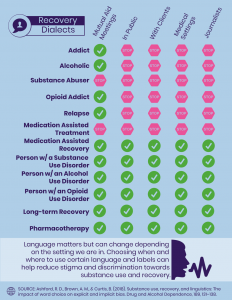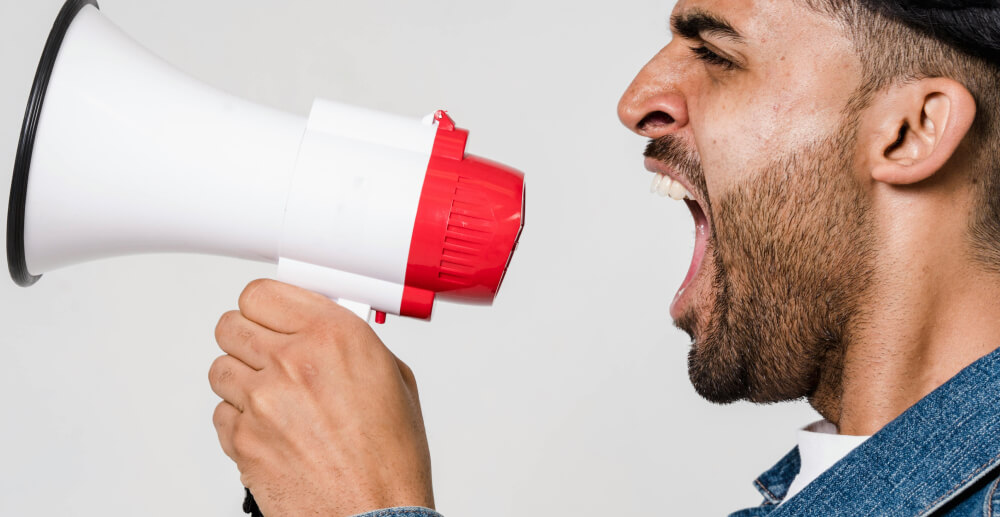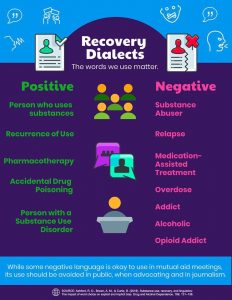There are over 250 labels identified to stigmatize people with mental illness that range from common derogatory terms to terms related to violence.
Don Coyhis, Founder and President of White Bison, once said, “Words are important. If you want to care for something, you call it a ‘flower’; if you want to kill something, you call it a ‘weed’.” This is a quote that has stuck with me and prompted me to learn more about Recovery Messaging – the language and terms we use to describe those living with substance use disorders. The language we use has remarkable impacts on how society views mental health and substance use disorders. Whether you are a person in recovery, a family member of a person in recovery, or an ally like myself, I believe that when we change our language, we can change our culture. We are Change Agents.
Stigma and Shame
Stigma is the “Scarlet Letter” worn by those affected by addiction, it can be felt first-hand and secondary. Stigma has led individuals who are living with substance use disorders and other mental health challenges to do so alone and in secret. Stigma leads to silence and in today’s climate, we no longer can remain silent. Shame is killing thousands of individuals a year. Educating ourselves and those around us empowers our community to support those who are most vulnerable.
Be Equipped
Utilizing resources in your community such as your local coalition, Recovery Community Organization, or Collegiate Recovery Program you can receive a bevy of training that will help you to better engage your circle of influence and change the tide right in your backyard. Recovery Messaging Training is a great way to learn “Recovery Dialects” that reduce stigma and offer a pathway to connection and citizenship without tearing down those we intend to help.

Opioid Overdose Response Training is becoming as common as CPR Training across the country. While opioid-related overdoses continue to rise, there is a marked decrease in the number of opioid-related deaths in our country. This has largely been credited to everyday people like you and I being trained to recognize the signs of an overdose, and appropriately administering naloxone – the life-saving medication, during the crisis event. Another great resource for those with lived experience is Recovery Coaching, a peer-assisted, strength-based approach that is useful in helping a person in or seeking recovery to make informed decisions about their use and define an appropriate course of action no matter if that is abstinence or harm reduction. Recovery coaches also assist individuals to find resources for treatment, detox, or to create a plan to recover on their own.
Be Empowered
Whether you elect to partake in just one of the trainings above or all of them, knowing your voice matters in your circle of influence makes all the difference. We often don’t recognize how much influence we have. If you engage in social media, are a part of an organization, or working a regular 9 to 5, you have a captive audience. Simply using Recovery Messaging in your day-to-day life can do a world of good.
Be Engaged
Knowing what is happening in the recovery community in your city is really important. Whether you are in recovery or not, being an active participant in advocacy and holding your community accountable for creating avenues to a healthy recovery is really important. Use your voice to create the change you want to see in the world.
Get Connected
There are many resources to help you get started. Below you will find a few links that can help point you in the right direction. There are often national and regional conferences hosted where you have an opportunity to further your learning and have a greater impact on your community.
Association of Recovery Community Organizations
Association of Recovery in Higher Education
“In a world where you can be anything, be kind.” -Jennifer Dukes Lee





